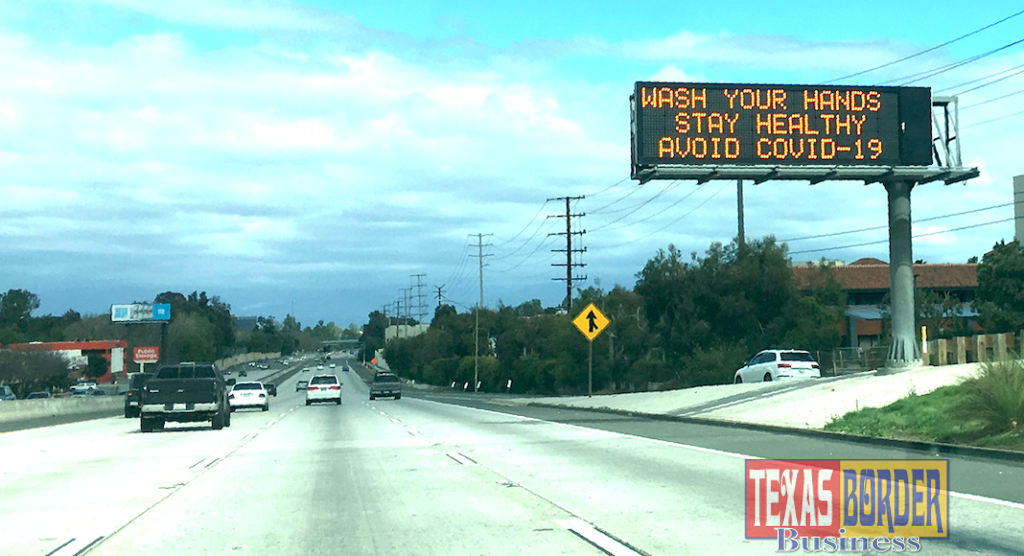Weather and its potential impact on how COVID-19 behaves has remained a consistent focus since the outbreak erupted.

Texas Border Business
AccuWeather Global Weather Center – The new coronavirus, and COVID-19, the disease it causes, took less than three months to travel around the world. After surfacing in late 2019, the virus has spread to more than 100 countries and, on March 15, 2020, the global death toll climbed above 6,000, just a few days after President Donald Trump declared a national emergency in the United States.
On March 11, the World Health Organization officially declared the coronavirus outbreak a global pandemic. This is the first pandemic in 11 years, according to the CDC.
The number of cases of COVID-19 outside of China exploded 13-fold over a two-week period covering late February into early March, WHO Director-General Tedros Adhanom Ghebreyesus said. “Thousands more are fighting for their lives in hospitals. We are deeply concerned both by the alarming levels of spread and severity and by the alarming levels of inaction.”
After weeks of spreading through the United States, the number of confirmed COVID-19 cases surpassed 4,400 and at least 78 deaths were blamed on the virus.
Weather and its potential impact on how COVID-19 behaves have remained a consistent focus since the outbreak erupted and experts are divided over what impact, if any, warmer weather will have on the spread of the outbreak.
Marc Lipsitch, professor of epidemiology at Harvard’s T.H. Chan School of Public Health, has said that warm weather will “probably not” slow down the spread, at least not significantly.
And Michael Osterholm, the director of Infectious Disease Research and Policy (CIDRAP) echoed that sentiment and cautioned that the world is only in the beginning stages of the outbreak. “This is a coronavirus winter,” he cautioned, saying he expects the outbreak to go on for six months or more. Both Lipsitch’s and Osterholm’s positions came in March and stand in opposition to some previous analysis.
In early February, Hong Kong University pathology professor John Nicholls said he expected the virus to “burn itself out” by around May because of increased sunlight, higher temperatures, and more humidity, according to a leaked transcript of a private conference call in early February.
In mid-March, Nicholls told AccuWeather that new research of a lab-grown copy of SARS-CoV-2, the virus that causes the COVID-19 illness, shows “In cold environments, there is longer virus survival than warm ones.” He also warned that “human factors” associated with the virus “are more unpredictable.”
The CDC has cautioned that not enough is known about the virus to say for sure that weather will affect the spread, but a spokesperson said, “I’m happy to hope that it [the threat] goes down as the weather warms up.”
As experts work toward a better understanding, the world shudders in fear of the unknown, a worry that has rocked global financial markets, leading to daily volatility in the U.S. stock markets.
Here are the latest updates, listed in eastern time, and the most important things you need to know about coronavirus.
March 17, 10:22 a.m.
The 146th Kentucky Derby set for May 2 has been postponed and rescheduled for Sept. 5, race officials announced Tuesday. The derby, held annually on the first weekend of May at Churchill Downs racetrack in Louisville, Kentucky, is considered the “longest continually held sporting event in America” with the first race taking place in 1875. It normally draws a crowd of more than 155,000 and throughout its history has been postponed just once — in 1945 when the U.S. government issued a temporary nationwide ban on racing, according to The Courier Journal.
March 17, 10 a.m.
New research conducted by scientists from the National Institutes of Health, Princeton University, and UCLA suggests that the new coronavirus can remain in the air for up to three hours and on some surfaces for two to three days. “Our results indicate that aerosol and fomite transmission of HCoV-19 is plausible, as the virus can remain viable in aerosols for multiple hours and on surfaces up to days,” researchers wrote in the study’s abstract.
March 17, 9:54 a.m.
Similar to San Francisco, more than 8 million residents of New York City may soon find themselves under a shelter in place mandate, according to the city’s mayor Bill de Blasio. “We’re absolutely considering that,” de Blasio said in a Tuesday morning interview to CNN. On Monday, the mayor signed an executive order that gives the city the power to enforce new rules requiring all restaurants, bars, and cafes to shift to delivery and take-out only as well as close all movie theaters, small theaters, nightclubs, and commercial gyms. The city’s schools were also ordered to close through April 20, but remote learning will begin Monday, March 23.
March 17, 7:41 a.m.
San Francisco Mayor London Breed announced on Monday that city residents will be legally prohibited from leaving their homes until at least April 7. The new restrictions are notably tighter than any other city and will require all non-essential businesses to close.
According to the city-issued Public Health Order, the only acceptable reasons to leave ones home are for basic needs, such as visiting a doctor, buying groceries or obtaining medicine.
March 17, 6:19 a.m.
Here are the latest updated numbers from John Hopkins University:
- Total confirmed cases: 182,986
- Total deaths: 7,155
- Total recovered: 79,433













